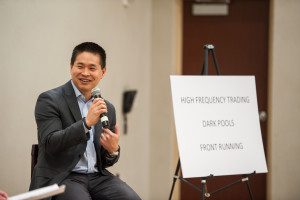President and CEO of IEX and former Head of Electronic Sales and Trading at The Royal Bank of Canada (RBC), Brad Katsuyama spent Wednesday presenting to students and area executives at events sponsored by Belmont’s Center for Executive Education and Edward C. Kennedy Center for Business Ethics.

The subject of Michael Lewis’s international best-seller “Flash Boys,” Katsuyama is most known for his refusal to adopt Wall Street’s practices of high frequency trading and dark pools, and instead, create his own transparent market to conduct trading in the way he believes the stock market was originally intended.
Although leaving his job at RBC was a challenge, Katsuyama knew he was in a position of power and if he saw things he didn’t agree with, it was time to make a change. “I felt this compelling purpose to say, ‘I’m probably in this position for a reason, and I have to do something about it,’” he said. For Katsuyama that meant quitting his job and structuring a team to create a new exchange built around innovation, transparency and fairness.
Since IEX launched in October 2013, the organization has seen rapid growth, but it wasn’t immediate. It took the team many months to raise the required funds and because of that, employees, including Katsuyama, weren’t paid what they were making in previous positions.
With a family and young children, this posed a challenge for Katsuyama, who says he learned that money isn’t as important as he initially thought. “Money becomes so much less meaningful, but it’s only until you don’t have it that you realize how unimportant it really is,” he said.
Now that Katsuyama is finding himself at the heart of the high frequency trading controversy, he continues to be committed to his belief in what the stock market was created to be – a transparent, open exchange for consumers. IEX utilizes technology to ensure they are able to access information at the same speed as high frequency trading firms. Although some organizations have used technology to create an information sharing asymmetry, giving an advantage to one party over another, IEX and Katsuyama are committed to utilizing technology for the advantages it provides all parties.
“Technology is a great amplifier,” Kaysyama said. “We are using [it] to create fairness, as opposed to skirting around it or even distorting it.”
When asked about values that contribute to his commitment to best practices and information transparency, Katsuyama said, “I view myself as someone lucky enough to have found the right people and make some good choices.” At the end of the day, Katsuyama believes the market should operate on fairness, and he is willing to fight for it – even if it means going up against some of Wall Street’s biggest players.


